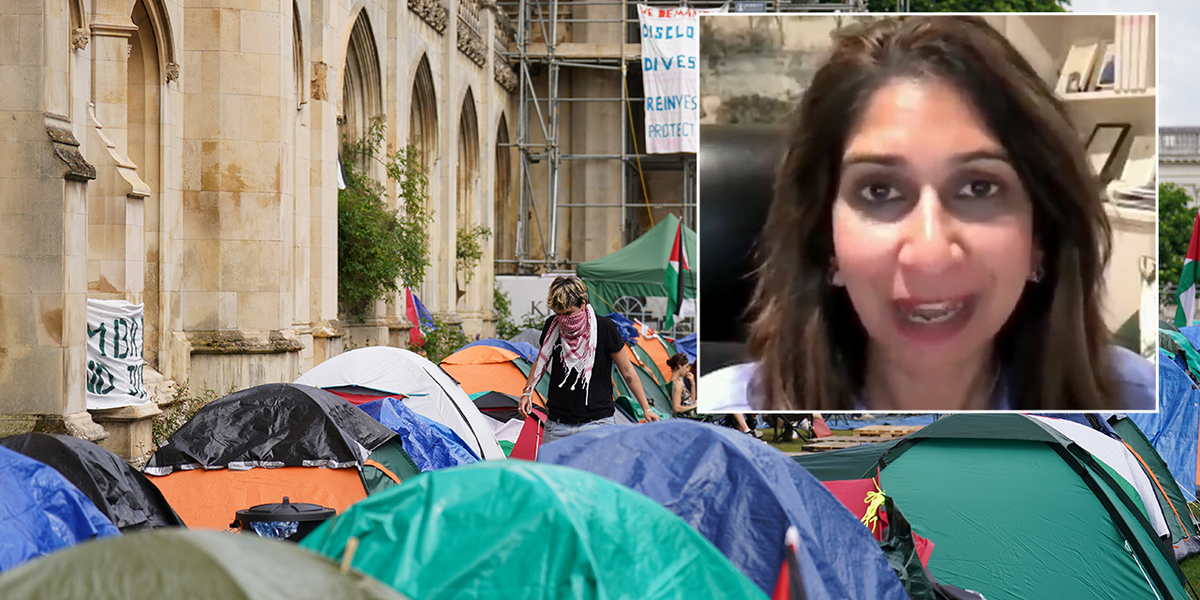Suella Braverman’s Speech Cancellation: A Clash of Ideologies at Cambridge University
In a recent episode that has sparked significant debate, Suella Braverman, the former Home Secretary, found herself at the center of controversy when her scheduled speech at the Cambridge University Conservative Association (CUCA) was postponed due to threats from a pro-Palestinian group. This incident has reignited discussions about freedom of speech, the role of universities in fostering open dialogue, and the growing tensions between differing political ideologies on campus.
The Context of the Cancellation
Braverman, who once led CUCA as a student two decades ago, was set to address a range of topics, including immigration and her pro-Israel stance. However, the event was called off after a pro-Palestinian group announced plans to protest outside the venue. Speaking on GB News alongside Nigel Farage, Braverman expressed her frustration over the situation, labeling the far-left activists as “bullies” who are “out of control.” She criticized the authorities for their perceived appeasement of these groups, suggesting that such actions contribute to a chilling atmosphere for free speech on campus.
The Rise of Campus Activism
The incident at Cambridge is not an isolated one; it reflects a broader trend of increasing activism on university campuses, particularly surrounding contentious issues like the Israeli-Palestinian conflict. This year, Cambridge has seen the emergence of pro-Palestinian encampments, which have become focal points for student activism. Braverman’s experience highlights the challenges faced by those who hold conservative views in an environment that can sometimes feel hostile to differing opinions.
Braverman articulated her belief that individuals on the center-right are often unfairly labeled as “far-right” simply for expressing their views. She stated, “If you’re on the centre-right, if you’re pro-Israel, if you want to talk about immigration, controlling immigration, you’re branded far-right.” This sentiment resonates with many who feel that political discourse is becoming increasingly polarized, making it difficult for constructive dialogue to take place.
The Role of Authorities and Security Concerns
Braverman recounted her determination to proceed with the event despite the planned protests, emphasizing her resilience in the face of opposition. However, the involvement of police changed the dynamics. After assessing the situation, law enforcement advised the event organizers that there was a security risk, leading to the eventual cancellation. This raises important questions about the responsibilities of universities and authorities in balancing safety with the right to free expression.
The former Home Secretary’s experience is indicative of a larger issue within academic institutions: the struggle to maintain a safe environment for all students while also upholding the principles of free speech. As Braverman noted, “They’re silencing students on campus. They’re silencing academics and they’re creating a very chilling atmosphere whereby freedom of speech is being snuffed out.”
A Broader Debate on Free Speech
The cancellation of Braverman’s speech has sparked a wider debate about the state of free speech in universities. Critics argue that the rise of activism can lead to an environment where dissenting voices are marginalized, while supporters of the protests claim they are exercising their right to challenge views they find harmful or offensive.
In her discussion with Farage, Braverman highlighted her previous confrontations with activists, including a notable encounter with Fiona Lali from the Revolutionary Communist Party. Their exchange underscored the deep divisions that exist regarding the Israeli-Palestinian conflict, with both sides firmly entrenched in their beliefs. Braverman defended Israel’s military actions as targeting Hamas, while Lali accused Israel of committing genocide, a claim that Braverman vehemently rejected.
Conclusion: The Future of Discourse in Academia
The postponement of Suella Braverman’s speech at Cambridge University serves as a microcosm of the larger cultural and political battles playing out across academic institutions. As universities grapple with the challenges of fostering open dialogue while ensuring the safety of their students, the question remains: how can we create an environment where diverse viewpoints can coexist without fear of retribution or violence?
The incident has reignited discussions about the importance of free speech and the need for universities to be bastions of open debate, rather than echo chambers that silence dissent. As the landscape of political discourse continues to evolve, it is imperative that all voices, regardless of their ideological leanings, are given the opportunity to be heard.
